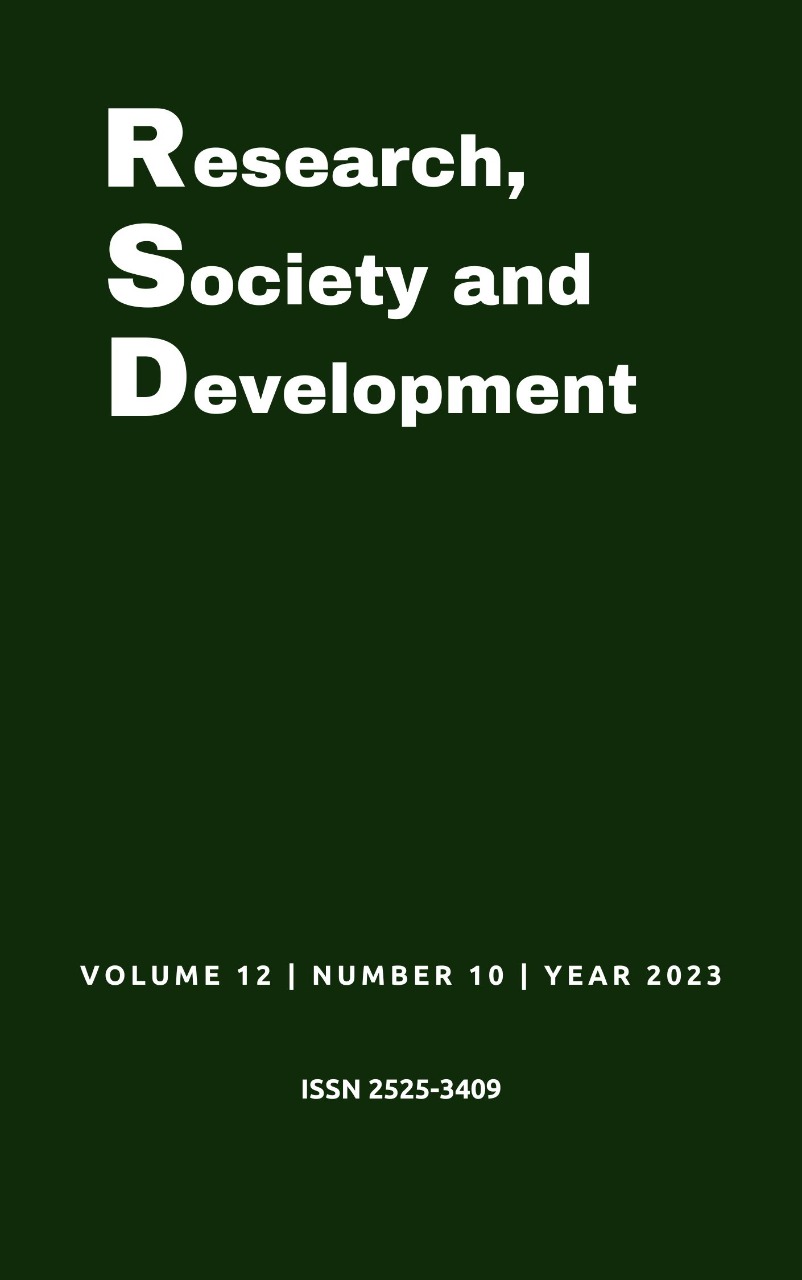The role of creatine supplementation in memory: A literature review
DOI:
https://doi.org/10.33448/rsd-v12i10.43297Keywords:
Memory, Creatine, Supplementation, Dementia, Alzheimer.Abstract
Introduction: The literature points out that creatine supplementation may be linked to a decrease in cognitive deficit. Objective: The present study aims to discuss the relationship between creatine supplementation and memory. Methodology: The search for articles was carried out in the database: Pubmed, published between the years 2019 and 2023, using the descriptors "memory", "creatine", "supplementation", "dementia", "alzheimer". 108 articles were found and 6 were used. Results: Trials in mice and the elderly have shown a potential to improve cognitive processing, especially in the elderly with conditions characterized by chronic pathologies such as deficiencies in creatine synthesis enzymes, mild traumatic brain injury and Alzheimer's disease. Conclusion: Although there is evidence that there is a correlation between creatine supplementation and the improvement of cognitive deficit, more studies are needed to trace the complete mechanism between these two conditions.
References
Bartus, R. T. (2000). On neurodegenerative diseases, models, and treatment strategies: lessons learned and lessons forgotten a generation following the cholinergic hypothesis. Experimental Neurology, 163(2), 495-529.
Béard, E., & Braissant, O. (2010). Synthesis and transport of creatine in the CNS: importance for cerebral functions. Journal of Neurochemistry, 115(2), 297-313. 10.1111/j.1471-4159.2010.06935.x
Brito, G. H. S. (2020). Os efeitos da suplementação de creatina no organismo. Tese - Pontifícia Universidade Católica de Goiás. Escola de Ciências Médicas, Farmacêuticas e Biomédicas, Goiânia, Brasil.
Engelhardt, E. et al. (2005). Treatment of Alzheimer’s Disease: recommendations and suggestions of the Scientific Department of Cognitive Neurology and Aging of the Brazilian Academy of Neurology. Arquivos de Neuro-Psiquiatria, 63(4), 1104-1112.
Mao, X. et al. (2021). Creatine Supplementation Upregulates mTORC1 Signaling and Markers of Synaptic Plasticity in the Dentate Gyrus While Ameliorating LPS-Induced Cognitive Impairment in Female Rats. Nutrients, 13(8), 1-10.
Marques, E. P. et al. (2019). Cross-talk between guanidinoacetate neurotoxicity, memory, and possible neuroprotective role of creatine. Biochimica Et Biophysica Acta (BBA) - Molecular Basis Of Disease, 1865(11), 1-12.
Mazzini L. et al. (2001). Effects of creatine supplementation on exercise performance and muscular strength in amyotrophic lateral sclerosis: preliminary results. Journal of Neurology Sciences, 191(1-2), 157-159.
Ministério da Saúde (BR). (2017). Aprova o Protocolo Clínico e Diretrizes Terapêuticas da Doença de Alzheimer. [Documento online]. Disponível em: https://www.gov.br/saude/pt-br/assuntos/protocolos-clinicos-e-diretrizes-terapeuticas-pcdt/arquivos/2020/portaria-conjunta-13-pcdt-alzheimer-atualizada-em-20-05-2020.pdf. Acessado em 10 de Setembro de 2023.
Ministério da Saúde. (2022). DOENÇA DE ALZHEIMER: Ministério da Saúde debate Primeiro Relatório Nacional sobre a Demência nesta quarta (21). [Documento online]. Disponível em: https://www.gov.br/saude/pt-br/assuntos/noticias/2022/setembro/ministerio-da-saude-debate-primeiro-relatorio-nacional-sobre-a-demencia-nesta-quarta-21#:~:text=o%20mapeamento%20produzido%20pela%20universidade,completo%20ser%c3%a1%20finalizado%20em%20202. Acessado em 10 de setembro de 2023.
Naclerio, F. (2001). Conceptos fundamentales acerca de la Creatina como suplemento o integrador dietético. Lecturas: Educación Física y Deportes, 3(12), 1-3.
Oliveira, E. F. et al. (2022). Association between dietary creatine and visuospatial short-term memory in older adults. Nutrition and Health, 18(1), 1-17.
Organização Pan-Americana de Saúde. (2021). O mundo não está conseguindo enfrentar o desafio da demência. [Documento online]. https://www.paho.org/pt/noticias/2-9-2021-mundo-nao-esta-conseguindo-enfrentar-desafio-da-demencia#:~:text=“O%20mundo%20está%20falhando%20com,si%20só%20não%20são%20suficientes. Acessado em 10 de setembro de 2023.
Rother, E. T. (2007). Revisão sistemátiva x revisão narrativa. Acta paul. enferm. 20 (2). https://doi.org/10.1590/S0103-21002007000200001
Sakellaris, G. et al. (2006). Prevention of complications related to traumatic brain injury in children and adolescents with creatine administration: an open label randomized pilot study. Journal of Trauma, 61(2), 322-329.
Sartini, S. et al. (2019). Maternal Creatine Supplementation Positively Affects Male Rat Hippocampal Synaptic Plasticity in Adult Offspring. Nutrients, 9(1).
Small, G., & Bullock, R. (2011). Defining optimal treatment with cholinesterase inhibitors in Alzheimer’s disease. Alzheimer's & Dementia, 7(2), 1-13.
Sullivan, P. G. et al. (2000). Dietary supplement creatine protects against traumatic brain injury. Annals of Neurology, 48(5).
Taylor, J. P. et al. (2020). New evidence on the management of Lewy body dementia. The Lancet Neurology, 19(2), 157-169.
Vale, F. A. C. et al. (2011). Treatment of Alzheimer’s disease in Brazil: II. Behavioral and psychological symptoms of dementia. Dementia & Neuropsychologia, 5(3), 189-197.
Xu, H. et al. (2021). Long-term effects of cholinesterase inhibitors on cognitive decline and mortality. Neurology, 96(e), 2220-2230.
York Health Economics Consortium. (2017). NICE: Overview of Systematic Reviews of Non-pharmacological Interventions for Dementia [Relatório final]. Heslington: University of York. https://www.nice.org.uk/guidance/ng97/evidence/appendix-o-yhec-report-pdf-174697045530. Acessado em 10 de setembro de 2023.
Downloads
Published
Issue
Section
License
Copyright (c) 2023 Maria Fernanda Santa Rosa Santos; Jorge Henrique Jacinto Júnior; Rubens da Silva Rios; João Pedro Santa Rosa Santos; Sthefani Lima Tamelini; Alessandra Cristina Pupin Silvério; Lidiane Paula Ardisson Miranda

This work is licensed under a Creative Commons Attribution 4.0 International License.
Authors who publish with this journal agree to the following terms:
1) Authors retain copyright and grant the journal right of first publication with the work simultaneously licensed under a Creative Commons Attribution License that allows others to share the work with an acknowledgement of the work's authorship and initial publication in this journal.
2) Authors are able to enter into separate, additional contractual arrangements for the non-exclusive distribution of the journal's published version of the work (e.g., post it to an institutional repository or publish it in a book), with an acknowledgement of its initial publication in this journal.
3) Authors are permitted and encouraged to post their work online (e.g., in institutional repositories or on their website) prior to and during the submission process, as it can lead to productive exchanges, as well as earlier and greater citation of published work.


